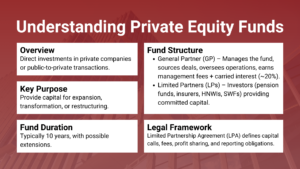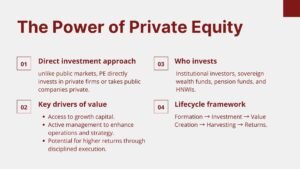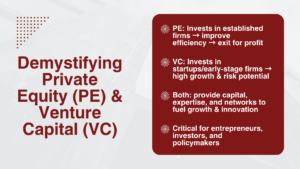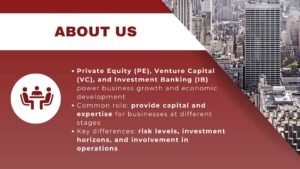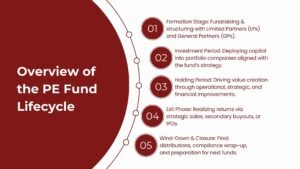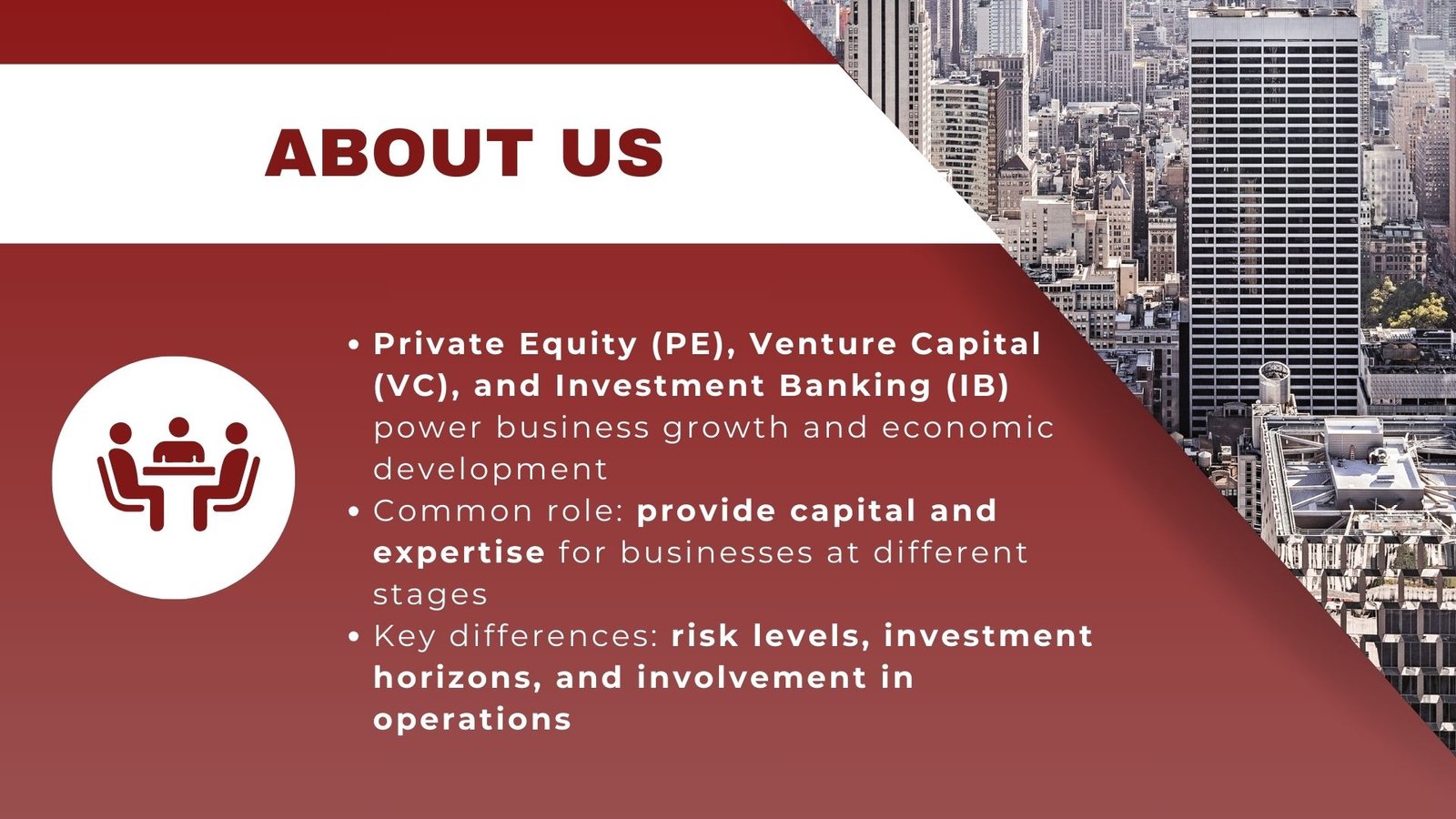
Private Equity Venture Capital and Investment Banking Explained in Finance
Private Equity Venture Capital and Investment Banking Explained in Finance
The three pillars within the contemporary financial markets are the forces connected with the capital formation, business expansion, and development of modern economy such as the sphere of the privateEquity, venture capital, and the sphere of investment bank. Though there exist some similar characteristics, including that they both offer funding and advisory services to the businesses, there are great differences concerning their goals, practices, and risk profiles. These three topics are important to understand by the students, entrepreneurs, and professionals who find their way in the financial sector. They each have a unique role in the lifecycle of businesses, whether these are start-ups at their outset or established companies considering a merger, acquisition, or a strategic exit.
The article examines their peculiarities, distinctions, and their overlapping in the environment of the whole investment. For instance, private equity typically focuses on restructuring and improving established companies, venture capital specializes in nurturing high-potential start-ups, while investment banking provides advisory and financial services that connect capital markets with corporate needs. Together, they form an interconnected framework that shapes the direction of industries, influences market confidence, and drives economic development across sectors. For professionals looking to deepen their expertise, taking an Industry-specific PE/VC course in Singapore can provide practical insights into these differences and prepare them for real-world financial decision-making.
The World of Private Equity: Unlocking Value in Established Firms
Private equity (PE) is the term used to designate investment funds which buy, either a majority or a strategic share of developed companies, usually with the purpose of enhancing their operating performance, financial results, and sustainable earnings. In contrast to venture capital operations, which are based on startups, the private equity operations are based on the restructuring of small and medium sized companies that are not yet mature and yet mature companies that are undervalued or mismanaged.
The corporations merge huge amounts of capital accumulated by institutional investors (like pension funds, insurance companies, sovereign wealth funds, and individuals with a large wealth) on the substrate of the presence of the private equity firms. This capital is invested in a long-configuration period that may be between five and ten years. Investment strategy can be buyouts using leverage financing (LBOs), growth equity and distressed investment acquisitions.
Active management is central in the process of value creation in the sphere of private equity. Companies can put new management in, streamline the operations, re-finance the debt, or look into new ways of exploiting the market. This is aimed at maximising the enterprise value and making high returns, after exiting, either by way of a public offering, merging or a private sale. The model has its share of risks though which can be seen through the Market crash, regulation, and execution of process improvement.
Venture Capital: Fueling Innovation and Startup Growth
Venture capital (VC) is a sector of private equity that targets early-stage companies with a high growth potential. Technology, healthcare and other innovative related startups rely heavily to use venture capital since other financing options, such as bank loans are not available because they are high-risk finances and without collateral. Learning more through a Venture capital course for professionals can help individuals understand these dynamics in practice.
VC companies can invest proceeds at a smaller scale than those noted on private equity, yet one with outsized returns in supporting the next industry disruptor. The money is normally advanced in phases, which include seed funding, Series A, B and C, each phase having various business development milestones. In addition to capital, venture capitalists can also give experiential advice, mentoring and linkages to industry systems, which can sometimes be as important as the cash.
The venture capital itself presents a high level of risk since the majority of the startups fail. The flipside, but the potential is gigantic should a company be triumphant and grow to international dimensions. Apple, Google, and Facebook are iconic companies, which were venture-funded start-ups, and the success stories of these companies drive further investor interest in VC. To entrepreneurs, venture capital is promising means of quick growth, entry to the market, and, after some time, exits in the form of acquisitions or initial public offerings (IPOs).
Investment Banking: Advisory, Capital Raising, and Market Intermediation
Investment banking is the meeting-point between corporations, investors and capital markets. Investment banks differ with private equity and venture capital firms as the latter invest directly in the companies whereas the investment banks are organizers of capital raising and corporate transactions. They offer services in underwriting securities, merger and acquisition (M&A) advice, initial public offering (IPO) management and structuring of complex financial transactions. For those aiming to master these concepts, enrolling in an Advanced corporate banking and finance course can provide deeper insights into the practices of this sector.
Investment bankers are supposed to offer their professional skills, market knowledge, and execution skills. As such, one can consider the case of a company that is going public, where the investment banks coordinate the initial public offering, and see to it that the IPO process complies with regulations, its pricing and demand resonate with the investors. They appraise companies that will be taken over in a merger or an acquisition, negotiate and structure transactions that will have high returns to shareholders.
Trading and asset management also form part of investment banking although they can be segregated into distinct divisions of global financial institutions. Prominent market actors in this market include firms such as Goldman Sachs, Morgan Stanley, and J.P. Morgan, which have giant operations in this market that spans numerous markets and industries.
Nevertheless, despite being such a crucial component, investment banking is at the receiving end of heat over high charges, conflict of interest and exposure to volatility of the market. However, the fact that it is involved in capital distribution and financial intermediation cannot make it dispensable in the world economy.
Comparing the Three: Distinct Roles in Business Growth
Though all three ways of funding business and establishing it with the help of the evaluation of the private equity, venture capital, and investment banking accomplish the similar purposes and involve business financing, their approaches are absolutely different. The aspect of long term ownership and operations of existing firms is also a major focus of private equity. Venture capital is risk oriented and is in its initial stages of innovation. Investment banking offers consulting and market dealing services and helps in the movement of money among companies and investors.
The other notable variation is risk and return portfolios. Value addition in existing businesses is aimed at stable but material returns by the private equity investors. Venture capitalists tolerate greater levels of risk in addition to exponentially increasing chances. Instead, investment bankers get compensated in service fees and do not take direct equity stakes as a practice.
Such models also balance off against each other in the cycle of business. A start-up can obtain venture capital to ramp up their business first, have the interest of a private equity firm to expand or restructure their business, and finally hire investment bankers to help with an IPO or acquisition. This interrelatedness outlines the intertwining of all the parts as to how they complement the greater financial culture.
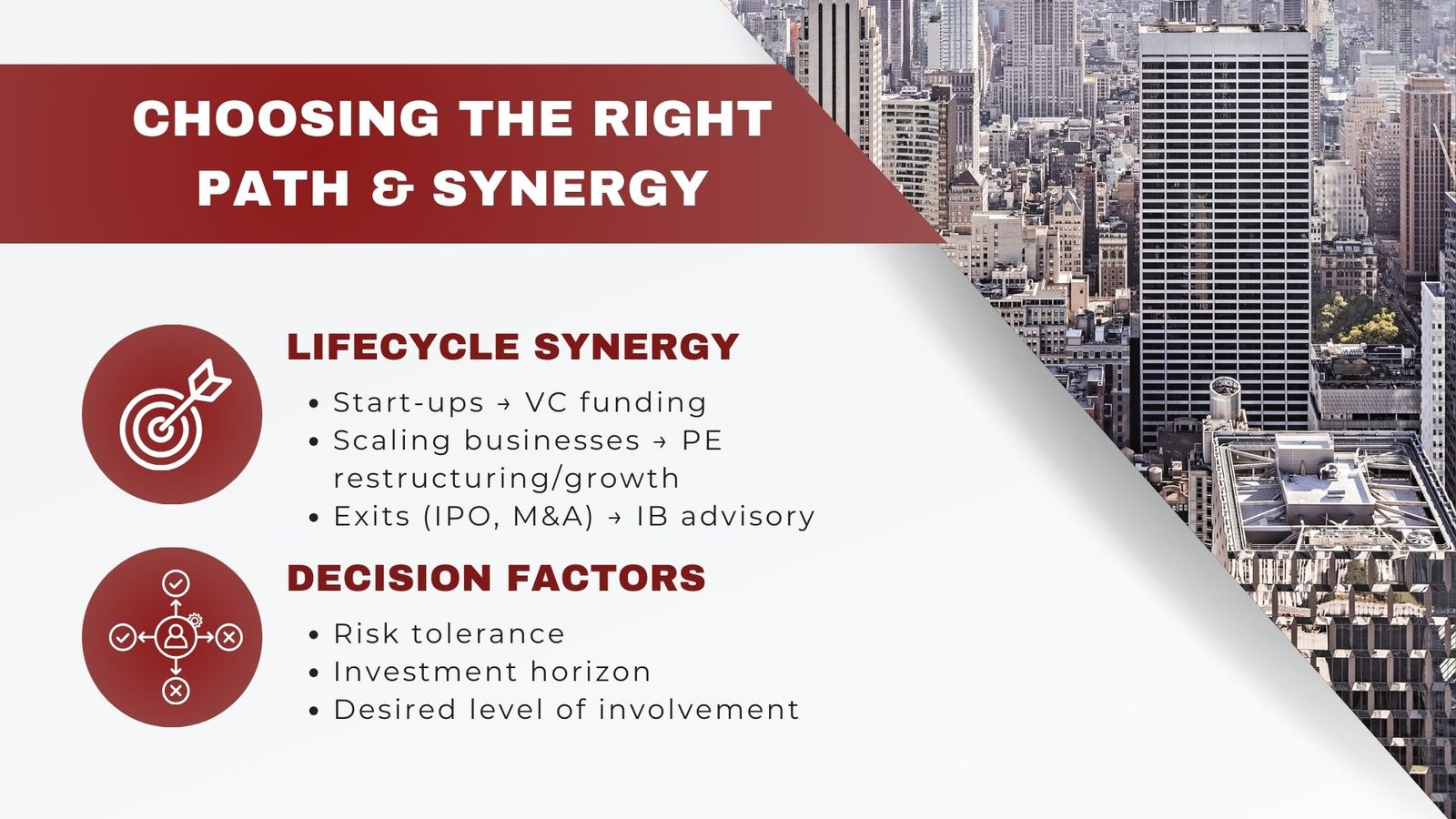
Conclusion: Choosing the Right Path in Finance and Investment
Though all three ways of funding business and establishing it with the help of the evaluation of the private equity, venture capital, and investment banking accomplish the similar purposes and involve business financing, their approaches are absolutely different. The aspect of long term ownership and operations of existing firms is also a major focus of private equity. Venture capital is risk oriented and is in its initial stages of innovation. Investment banking offers consulting and market dealing services and helps in the movement of money among companies and investors.
The other notable variation is risk and return portfolios. Value addition in existing businesses is aimed at stable but material returns by the private equity investors. Venture capitalists tolerate greater levels of risk in addition to exponentially increasing chances. Instead, investment bankers get compensated in service fees and do not take direct equity stakes as a practice.
Such models also balance off against each other in the cycle of business. A start-up can obtain venture capital to ramp up their business first, have the interest of a private equity firm to expand or restructure their business, and finally hire investment bankers to help with an IPO or acquisition. This interrelatedness outlines the intertwining of all the parts as to how they complement the greater financial culture.



